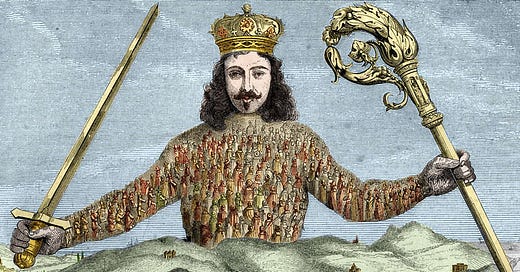Yesterday, we discussed the Objectivist depiction of anarchy in response to Jack Nicastro. To finish off my initial comments on what I expect to be a fun exchange, we will today talk about Ayn Rand’s depiction of the government.
To summarize the Objectivist position again, anarchy is undesirable because of: (1) what anarchy is, and (2) what the government is. More specifically:
Anarchy:
Means mob rule via individuals protecting their own rights, since it’s everyone vs everyone, or put another way, rule by brute force
Produces an unstable equilibrium of competing governments
Meanwhile, government:
Gave us society, the division of labor, and modernity
Subordinates:
Might to right
Use of force to objective law
Men/bullies to the rule of law
Proper purpose is to make society possible and protect individual rights
Are established to provide objective law and arbitration
Works with the proper checks and balances, etc
In summary, anarchy leads to chaos, while governments create stability around the rule of law. Today, we discuss Rand’s view of the state.
There is no baby to throw out, only bathwater
Jack’s initial comments regarding the value of respecting individual rights were:
“Throwing the baby of society, division of labor, and modernity out with the bathwater of immoral actions of criminal men and tyrannical government is not the answer.”
This comment was the one that confused me the most in the entire post. I anticipate clarification from Jack.
If he is saying the following, I reject it. I reject the idea that society, the division of labor, and modernity itself are the product of the state. Theoretically, the state is necessarily a parasite to society, and historically, both civilization and the division of labor predate any absolute state. The state is inherently an attempt to circumvent the division of labor and acquire resources via extortion. Likewise, it was the mass implementation of the free market that created our modern level of wealth, all in spite of states trying their darnedest to get in the way.
Given this proper characterization of the state, it becomes clear that the state does not subordinate might to right, but is in fact the institutionalization of might! As such, it cannot enforce the natural objective law in any morally legitimate way, since it is by its very nature a violation of the natural law. Yes, individual actions of moral justice may occur. But no amount of justly prosecuted murderers changes the moral nature of the institution itself. The very fact that it must be imposed and is historically not the result of any voluntary formation indicates its unacceptable existence. The state is the exact bully it purports to control.
The State’s Real Purpose
This is the real purpose of the state — to extract from society to support its most powerful bandits. The state does not “make social existence possible to men” — it actively works against civilization.
I am sure that Jack will provide a more thorough explanation of his position, but his initial post is, frankly, a compilation of unsupported assertions. There is no argument presented. “We ought to be minarchists instead of anarchists because the state makes “social existence possible to men, by protecting the benefits and combating the evils which men can cause to one another” seems to be his claim, but that assertion made is precisely the debated point. I reject the notion the state is anything but a destabilizing force in society, a destroyer of civilization. the state does not protect the benefits cooperation affords men, nor does it combat evils that come from men living together. More must be said here, and I look forward to his substantiations of this claim.
As I have discussed previously, by its very nature, the state is incapable of performing rational economic calculation in any field. This means that every act it may take is improperly guided. Even under the best case scenario, central planners are grasping in the dark, whether they are trying to coordinate food production or policing services. I see no reason presented by Jack to change this position.
A perfect constitution can’t fix any of this
It is also fanciful to believe that the state will be anything but what its nature demands so long as we construct the “right” checks and balances. No written constitution erases the calculation problem. It does not matter what it says. And given the state’s parasitical nature, there is no reason to believe that giving absolute power to a country’s most psychotic individuals is a good idea, and it is recklessly naive to think that they will restrict their behavior because of a piece of paper.
Indeed, the first piece of legislation to come out of Congress following the adoption of the Constitution, the Judiciary Act of 1789, was unconstitutional. The ink on the Constitution wasn’t even dry yet! The first decade under the Constitution saw that law, the establishment of the First Bank of the United States, the Alien and Sedition Acts, and an undeclared quasi-war with France.
Conclusion
What are we left with? An inaccurate portrayal of anarchy and a naive view of the state. Anarchy is not disorderly nor unstable. The state is a gang of thieves writ large — the real source of societal destabilization. History does not support a theory of men, longing for “objective laws and of an arbiter for honest disagreements”, forming states. No formulation of the state can rationally, and thus efficiently, provide anything of value to society, and its abhorrent nature seeps poison into society, straining interpersonal relationships. The only proper path is anarchy. Anything else is uncivilized.


